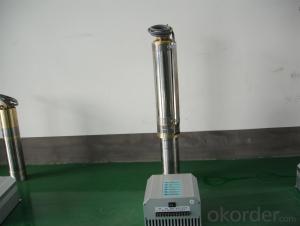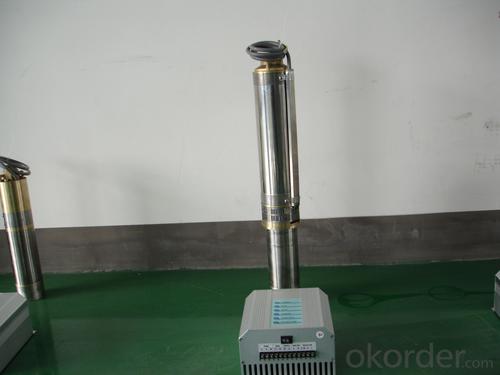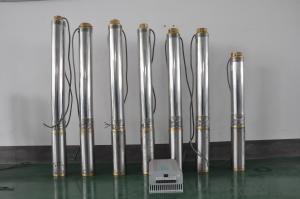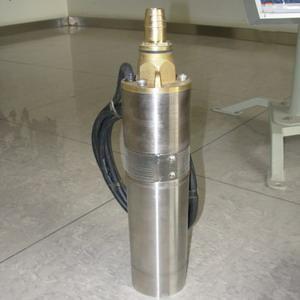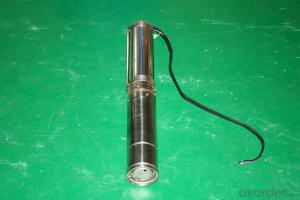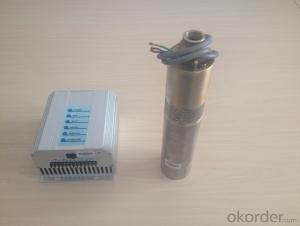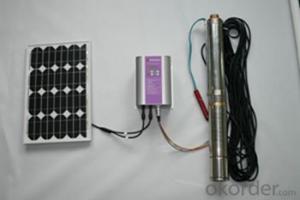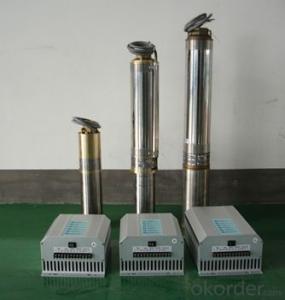Aisitin Solar Pump - Submersible Solar Pump
- Loading Port:
- China Main Port
- Payment Terms:
- TT OR LC
- Min Order Qty:
- -
- Supply Capability:
- -
OKorder Service Pledge
OKorder Financial Service
You Might Also Like
Item Description :
This superb new addition to our solar fountain range comes with a 10w solar panel,and a powerful fountain pump that is capable of producing fountains of up to 2m in height. As well as being easy to set up and use.Instruction manual is supplied for assembly and maintenance.
Solar Fountain Key Features :
Powered by direct sunlight
No high voltage electric mains required
Safe for children
Max. height of fountain: 2M
Max. flow capacity: 800 L/H(176 GAL)
10W Polycrystalline solar panel included
18V DC brushless pump
Solar Pump Features :
Can produce fountains up to : 2M (tube height) 1.4M (fountain height)
Comes with multiple nozzle accessories
Cable Length : 5M
Solar Panel Features :
10W peak power.
Polycrystalline highly efficient solar panel
Comes mounted in aluminium frame
Comes with ground stake and rotating knob so you can angle your panel toward the sun
What You Will Get :
10W solar panel
Solar pump
Ground Sake
Nozzle accessories
Precautions :
DO NOT alter or change the product itself or its components
Operate pump in freshwater only, never above 50 degrees celsius
Keep away from flammable liquids
Do not connect to any other power supply other than the included
- Q: Can a solar pump be used for firefighting in remote areas?
- Firefighting in remote areas can benefit greatly from the use of solar pumps. These pumps are incredibly versatile, capable of extracting water from various sources like rivers, lakes, and wells. They prove particularly invaluable in areas where electricity is scarce or unreliable. Solar pumps are specifically designed to operate solely on solar energy, making them an ideal option when traditional power sources are unavailable. By utilizing solar panels, they can effectively power themselves, rendering them highly suitable for firefighting in remote regions. These pumps possess the ability to generate substantial water pressure, allowing them to propel water over long distances. This characteristic is of utmost importance in firefighting endeavors. Additionally, their portability enables easy transportation and installation in isolated locations, empowering firefighters to swiftly attain water sources and combat fires efficiently. Moreover, solar pumps are environmentally friendly, emitting zero emissions and requiring no fuel to operate. This is a significant advantage in remote areas where preserving the natural surroundings is paramount. To summarize, solar pumps offer a dependable and efficient solution for firefighting in remote areas. They provide a sustainable and accessible water source, guaranteeing that firefighting efforts can be carried out effectively in these challenging locations.
- Q: Can a solar pump be used for mine dewatering or industrial applications?
- Yes, a solar pump can be used for mine dewatering or industrial applications. Solar pumps are becoming increasingly popular in these sectors due to their numerous advantages. Firstly, solar pumps are powered by the sun, making them a sustainable and environmentally friendly choice. This is particularly important for mine dewatering and industrial applications, where reducing carbon emissions and minimizing the impact on the environment is crucial. Secondly, solar pumps are cost-effective in the long run. While the initial installation costs may be higher compared to traditional pumps, solar pumps have lower operational and maintenance costs. They do not require fuel or electricity to operate, which significantly reduces ongoing expenses. Furthermore, solar pumps are highly reliable and can operate in remote locations with limited access to electricity grids. This makes them suitable for mine dewatering in areas where there is no reliable power supply or for industrial applications in remote regions. Solar pumps are also easy to install and can be quickly deployed, which is particularly beneficial for temporary or emergency dewatering needs in mines or industrial sites. Additionally, solar pumps can be equipped with advanced monitoring and control systems, allowing for remote operation and real-time data monitoring. This improves efficiency, reduces downtime, and enhances the overall management of the dewatering or industrial processes. In conclusion, a solar pump can indeed be used for mine dewatering or industrial applications. Their sustainability, cost-effectiveness, reliability, and adaptability to remote locations make them an attractive option for these sectors.
- Q: Can a solar pump be used in areas with limited access to water pumps?
- Yes, a solar pump can be used in areas with limited access to water pumps. Solar pumps are a great alternative in remote or off-grid locations with limited infrastructure. They rely on solar energy to power their operation, making them independent of the electrical grid and reducing the need for traditional water pumps that require electricity or fuel. Solar pumps are efficient, cost-effective, and environmentally friendly solutions for providing access to water in areas where traditional pumps may not be feasible.
- Q: What is the expected maintenance cost for a solar pump system?
- The expected maintenance cost for a solar pump system can vary depending on various factors such as the size of the system, quality of components, and environmental conditions. However, generally speaking, solar pump systems are known for their low maintenance requirements. Basic maintenance tasks such as regular cleaning of solar panels, checking for any blockages in the pump, and monitoring system performance can be performed by the user. On average, the annual maintenance cost for a solar pump system can range from $100 to $500.
- Q: How much power does a solar pump require?
- The power required for a solar pump depends on various factors such as the desired flow rate, head pressure, efficiency of the pump, and available sunlight. Generally, a solar pump can range from a few watts to several kilowatts.
- Q: What is the payback period for a solar pump investment?
- The payback period for a solar pump investment is the amount of time it takes for the initial investment to be fully recovered through energy savings and other financial benefits. It is a crucial metric for evaluating the financial viability of such an investment. The actual payback period for a solar pump investment can vary depending on various factors such as the cost of the equipment, installation expenses, energy tariffs, and maintenance costs. Additionally, the amount of energy generated by the solar pump and the price of alternative energy sources in the region also play a significant role in determining the payback period. Typically, solar pump investments have relatively shorter payback periods compared to traditional pump systems powered by non-renewable energy sources. This is due to the lower operating costs associated with solar power, as sunlight is a free and abundant resource. Moreover, solar pumps require minimal maintenance and have a longer lifespan, reducing overall operational expenses. On average, the payback period for a solar pump investment ranges from 2 to 5 years. However, in some cases, it can be as short as 1 year or as long as 7 years, depending on the aforementioned factors. It is important to conduct a thorough financial analysis considering these variables to determine the specific payback period for a solar pump investment. Despite the initial capital required, a shorter payback period indicates a more financially attractive investment. Once the payback period is achieved, the solar pump investment will continue to generate energy savings and financial benefits for an extended period, contributing to long-term cost reductions and environmental sustainability.
- Q: Can a solar pump be used for water circulation in aquaculture systems?
- Yes, a solar pump can be used for water circulation in aquaculture systems. Solar pumps are an eco-friendly and cost-effective solution for circulating water in aquaculture systems as they harness the power of the sun to operate. They can provide a consistent flow of water, ensuring proper oxygenation and filtration necessary for the health and growth of aquatic organisms in aquaculture systems. Additionally, solar pumps can be easily installed in remote locations, making them a suitable option for off-grid aquaculture setups.
- Q: How does the elevation of a location affect the performance of a solar pump?
- The elevation of a location can affect the performance of a solar pump primarily due to changes in air pressure and temperature. As elevation increases, the air pressure decreases, leading to lower atmospheric density. This reduced density can affect the efficiency of the solar pump, as it relies on air movement for cooling and heat dissipation. Additionally, higher elevations often experience lower temperatures, which can impact the overall performance and efficiency of the solar pump, especially if it relies on sunlight for power generation.
- Q: What is the role of sensors in a solar pump system?
- The role of sensors in a solar pump system is to monitor and measure various parameters such as solar radiation, water levels, pressure, and temperature. These sensors provide crucial data that helps optimize the performance and efficiency of the pump system. They enable the system to adjust pump speed, water flow, and other parameters in real-time, ensuring optimal energy utilization and preventing damage or malfunction. Overall, sensors play a vital role in enhancing the functionality, reliability, and overall performance of a solar pump system.
- Q: How does a solar pump handle water with high levels of fluoride or other chemicals?
- A solar pump, by itself, does not have the capability to handle water with high levels of fluoride or other chemicals. However, additional water treatment methods or devices can be integrated into the system to effectively remove or reduce these contaminants before the water is pumped.
Send your message to us
Aisitin Solar Pump - Submersible Solar Pump
- Loading Port:
- China Main Port
- Payment Terms:
- TT OR LC
- Min Order Qty:
- -
- Supply Capability:
- -
OKorder Service Pledge
OKorder Financial Service
Similar products
Hot products
Hot Searches
Related keywords
